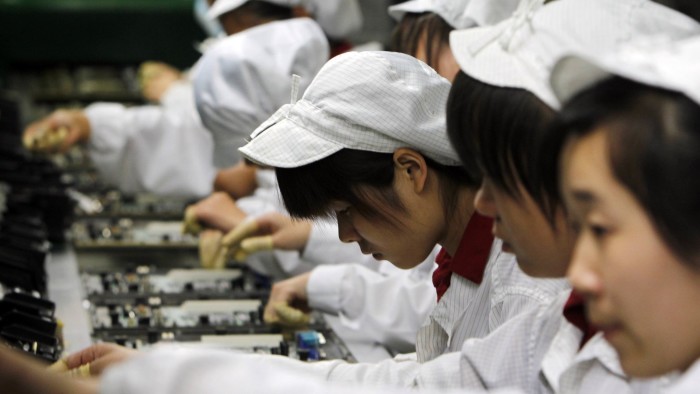Illegal overtime in China factory highlights labour woes

Roula Khalaf, Editor of the FT, selects her favourite stories in this weekly newsletter.
The admission from Apple supplier Foxconn that students worked illegal overtime at its iPhone manufacturing plant underscores how Chinese companies are turning to schools to fill gaps in the country’s labour force.
The FT has spoken to six people who said they were part of a cohort of 3,000 student interns from Zhengzhou Urban Rail Transit School sent on compulsory “work experience” at the local Foxconn facility. There they assembled iPhones — a task that had nothing to do with their studies to become train attendants and railway managers.
Foxconn confirmed the Zhengzhou students “did work overtime in violation of our policy”. Students are banned under Chinese law from working overtime.
Such companies are resorting to employing students as Chinese manufacturers wrestle with rising wages and the difficulty of finding flexible workers.
The sectors most likely to abuse student labour are the electronics and textiles industries, according to the Center for Child Rights and Corporate Social Responsibility. The Beijing-based charity found that 14 of the 24 electronics factories it surveyed said they used student workers.
China’s local governments are under pressure to supply flexible labour to factories to stop employers relocating their facilities to other Asian countries. At the same time, Beijing is aware that young people must be educated to a higher standard if the country is to shed its low-cost tag and compete globally.
Scott Rozelle, co-director of the Rural Education Action Program at Stanford University, says the compulsory recruitment of student interns into factories is widespread across China. “It’s not just Foxconn sending students to factories but the whole of China,” he says.
He fears the tension between China’s rising wealth and its inadequate education system will have serious consequences. “Kids aren’t learning in these internships . . . China is going to collapse if its human capital continues to be so bad and so unequal.”
Ms Yang, an 18-year-old secondary school student, told the FT that she and the other interns worked 11-hour days assembling Apple’s new iPhone X.
“If I don’t stay [at Foxconn] I won’t graduate school, but my body can’t take it,” says Ms Yang, who declined to give her full name for fear of being identified. “My mum says if I can’t stand it, maybe I can leave school and work with my dad.”
If she did drop out of education, it would add to a trend that threatens Beijing’s target of a 90 per cent enrolment rate for upper-secondary education by 2020.
In 2016, only 9.3m students graduated from China’s upper-secondary schools, less than two-thirds of that age cohort, according to official statistics.
Economists believe China must upgrade its workforce to avoid falling into the “middle income trap” — where a country’s growth fizzles out before it becomes prosperous.

The country has expanded its vocational schooling as part of its Made In China 2025 industrial policy. But with no national assessment of teaching quality, those schools have become a source of flexible labour for local factories.
“Improving the quality of vocational education is necessary to address the major changes and contradictions in Chinese society,” Zhang Laiming, vice-minister of the State Council’s Development Research Center, said at a recent forum organised by JPMorgan in Beijing.
He said the quality of vocational school tuition in China was poor and that vocational education was looked down upon by employers and parents. Thirty-six per cent of China’s new workers are from vocational schools.
In response to abuses of student interns from vocational schools, the government has passed laws limiting the use of students to less than six months and has banned overtime. But Yang Po, an associate professor at Peking University, says schools have “faced big challenges in adjusting to these laws”.
SACOM, the Hong Kong-based workers’ rights group, earlier this year found that tech groups Acer and Fujitsu sourced their goods from such students. SACOM claims that students comprised about half of the workers on assembly lines at a Quanta Computer factory in Chongqing that supplies Acer and Fujitsu.
Quanta Computer, the world’s biggest laptop manufacturer, said: “We have treated the allegations seriously and hence strongly demanded our agents to ensure the justifiability of their labour sources.”
Acer confirmed student workers are used in some factories to “ease labour pressure”, while Fujitsu declined to comment on the Quanta factory. Both companies said they insisted on adherence to local laws when selecting suppliers.
Of the student interns working illegal overtime at Foxconn’s Zhengzhou factory, Apple said: “We have confirmed the students worked voluntarily, were compensated and provided benefits, but they should not have been allowed to work overtime.”
After the FT published the Zhengzhou plant story on Tuesday, all student interns were removed from overtime duty, according to a Foxconn employee at the facility.
Ms Yang has now left the factory and returned to her school dormitory, where she awaits her teachers’ decision on whether she will be punished for her departure or told to return to Foxconn with next year’s students.
“[Student labour] is also the problem of the rigidity and backwardness of the school system, and of the labour market,” says a Foxconn manager. “It is the problem of the whole system.”
Comments